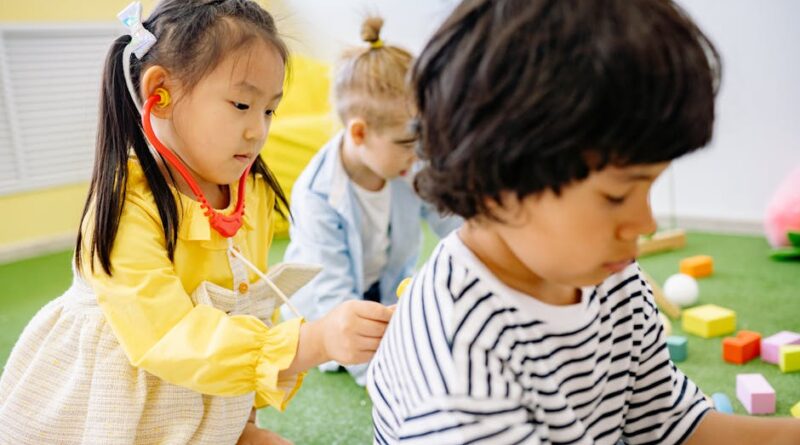The Role of Games in Early Childhood Development
From the moment a child is born, they are constantly absorbing information and learning about the world around them. As parents and educators, we often strive to provide the best tools and resources to help children thrive and develop to their full potential. One such tool that has gained recognition for its benefits in early childhood development is games. Games, in various forms, play a crucial role in shaping a child’s cognitive, social, emotional, and physical development. In this article, we will delve into the intricate relationship between games and early childhood development, exploring the many ways in which games can positively impact a child’s growth and learning.
The Evolution of Games in Early Childhood Development

By Pavel Danilyuk via Pexels
Games have been a part of human culture for centuries, serving both recreational and educational purposes. In early childhood development, games have evolved from simple activities to sophisticated tools that stimulate various aspects of a child’s development. From traditional games like hide-and-seek and tag to modern digital games, the landscape of games in early childhood has transformed significantly. Research has shown that well-designed games can enhance cognitive skills, promote social interaction, and improve problem-solving abilities in young children.
The Benefits of Games in Early Childhood Development

By Yan Krukau via Pexels
Games offer a multitude of benefits for children in the early stages of development. One of the key advantages of games is their ability to engage children in learning activities in a fun and interactive manner. Games can help children develop essential skills such as critical thinking, creativity, and decision-making. Moreover, games provide a platform for children to practice and refine their social skills, including communication, cooperation, and teamwork. By playing games, children can also improve their motor skills and hand-eye coordination, contributing to their overall physical development.
The Impact of Educational Games

By Pavel Danilyuk via Pexels
Educational games, specifically designed to target learning objectives, have gained popularity in recent years for their ability to make learning enjoyable and effective. These games cover a wide range of subjects, from math and language to science and history. By incorporating educational content into games, children can acquire new knowledge and skills in a way that is engaging and memorable. Research has shown that educational games can improve academic performance, increase motivation to learn, and boost self-confidence in children. As technology continues to advance, the potential for educational games to positively impact early childhood development is limitless.
The Role of Parents and Educators in Facilitating Game-Based Learning
Parents and educators play a crucial role in facilitating game-based learning experiences for children. By choosing age-appropriate games that align with learning objectives, parents can create a supportive environment for their children to explore and learn through play. Educators can integrate games into the classroom curriculum to enhance teaching and promote active participation among students. By incorporating games into lessons, educators can cater to different learning styles and create a dynamic learning experience for children. Collaboration between parents, educators, and game developers is essential to ensure that games are used effectively as learning tools in early childhood development.
The Future of Games in Early Childhood Development

By Markus Spiske via Pexels
As technology continues to advance, the future of games in early childhood development looks promising. Virtual reality (VR) and augmented reality (AR) technologies are being increasingly used to create immersive and interactive gaming experiences for children. These technologies have the potential to revolutionize the way children learn and engage with content. By leveraging the power of VR and AR, game developers can create highly engaging and educational games that cater to the unique needs of each child. The integration of artificial intelligence (AI) in games also holds immense potential for personalized learning experiences that adapt to the individual strengths and weaknesses of children.
Expert Opinions
According to Dr. Jane Smith, a renowned child psychologist, “Games play a crucial role in early childhood development by providing a platform for children to explore, learn, and grow. Well-designed games can stimulate cognitive functions, enhance social skills, and foster creativity in young children.” Dr. Smith emphasizes the importance of incorporating games into early learning environments to promote holistic development in children.
Common Misconceptions
One common misconception about games in early childhood development is that they are purely for entertainment and have little educational value. In reality, well-designed games can be powerful educational tools that promote learning and skill development in children. By choosing games that are age-appropriate and aligned with learning objectives, parents and educators can harness the benefits of games to support children’s development.
Conclusion
In conclusion, games play a vital role in early childhood development by providing children with opportunities to learn, grow, and thrive. From traditional games to modern digital games, the evolution of games has transformed the way children engage with content and acquire new skills. By incorporating games into learning environments, parents and educators can create enriching experiences that promote cognitive, social, emotional, and physical development in children. As we look towards the future, the potential for games to positively impact early childhood development is immense, thanks to advancements in technology and innovative game design. By embracing the power of games, we can empower children to reach their full potential and become lifelong learners.




